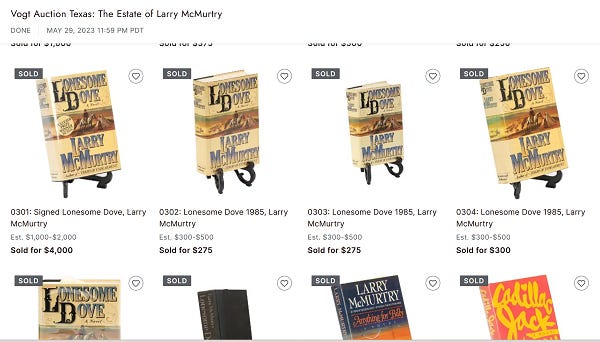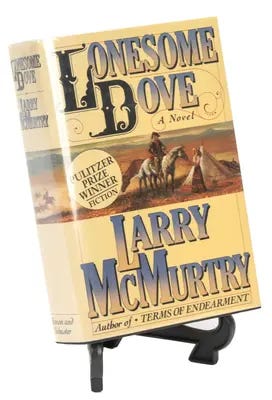Auction Madness, Movie Mania, and Regret
A link to the latest new arrivals from Downtown Brown Books and thoughts on the recent McMurtry estate auction and the sale of Alejandro Jodorowsky's Dune book.
List 91: Modern First Editions is now live on my website—newsletter subscribers get the announcement first.
Harry Crews, Larry McMurtry and Others
As writers, Harry Crews and Larry McMurtry would seem to have little in common. McMurtry grew up in remote Archer County, within living memory of cattle drives and open prairie. Crews’s South—he was born in Georgia and lived most of his life in Florida—was Gothic, not so far from McMurtry’s vision of the region, “I saw the South,” he wrote in Walter Benjamin at the Dairy Queen (p. 126), “as a place of vainglory, bitterness, and megalomania…the opposite of Archer County.”
Yet for some reason, many book collectors pursue both authors. Perhaps one of you will explain it to me. In any case, this week’s list of new arrivals has a bunch of books by Crews and more by McMurtry, all from the same collection. Plus there are a lot of other books that I find interesting, and hopefully you will, too.
McMurtry Auction Madness
In my last newsletter, I wrote about the then-upcoming Larry McMurtry estate auction. I criticized the auction house for announcing the McMurtry estate auction and then at the last minute adding hundreds of additional items to the sale that didn’t belong to McMurtry, while continuing to promote the sale as the McMurtry estate auction.
The event was on Memorial Day, and I went into my shop for a few hours to catch the livestream. At 1:00 P.M., my wife texted me a photo from our balcony of her burrito-and-Diet-Coke lunch with the caption, “Living my best life over here.”
I wrote back, “I’m watching the McMurtry auction and exchanging snarky texts with [a friend], which might be my best life, too.”
People paid a lot for McMurtry’s stuff, particularly if it had something to do with Hollywood:
$30,000 for the Easton Press version of the Lonesome Dove Tetralogy, signed by McMurtry and many actors from the TV mini-series (surely an Easton Press record price!);
$27,500 for a signed first edition of The Last Picture Show. This wasn’t even one of the copies McMurtry got from the publisher when the book first came out. It had someone else’s address sticker inside, so it was probably just a used book that McMurtry bought through his bookstore Booked Up and decided to take home.
$8,500 for a British paperback copy of Hud from the 1970s. I didn’t look at this before the sale, and when it went for so much, I thought it was the US paperback, which at least has a picture of Paul Newman on the cover (I sold a signed copy of that edition in 2021 for $100). But it wasn’t the Paul Newman cover, it was just a drugstore paperback with the movie title (the original title was Horseman, Pass By).
These results brought to mind something McMurtry wrote in his novel about an antique dealer, Cadillac Jack, which has many scenes set in low-rent auction rooms:
“Despite my constant immersion in the passion of auctions, I could not get over the avidity of this crowd. Even those who were glasseyed from the heat and the crush were trembling with eagerness.”
In my previous newsletter, I predicted that the public would likely be confused by the somewhat misleading marketing of this “estate” sale, and I think I was right. The auctioneers kept reminding the audience from the podium that a bid was a legally binding contract in Texas. “All sales are final,” one of them said. “We don’t want to get involved in your personal problems.”
After the McMurtry estate section ended, the auction house offered more copies of McMurtry’s books, only these hadn’t come from “a master author’s bedroom,” as the auctioneer liked to say about McMurtry’s books. Instead, they came from the shelves of some random Texans. As a result of being in the “McMurtry” sale, they went for w-a-a-a-a-y too much money.
A signed 12th printing of Lonesome Dove was lot 301 in the McMurtry “estate” sale, and it was the first lot that didn’t belong to him. It went for an unbelievable $4,000, which is ten times what you could pay for an equivalent copy on AbeBooks. In fact, as of this writing, the most you could spend on a copy of Lonesome Dove is $1750 for a fine signed first.
That’s the way it goes at auctions, sometimes the mania takes over.

Auction Regrets
If you participate in auctions, you’ve likely experienced regret. Sellers often regret that their property sold for too little. Buyers regret paying too much or dropping out too soon.
A very big case of auction regret is about to play out at Heritage Auctions.
On July 8, they are offering a book detailing Alejandro Jodorowsky’s magnificent, Surreal, and probably un-realizable vision for a film based on Frank Herbert’s Dune. If you aren’t a film buff, you might not be aware that Jodorowsky’s Dune is the most legendary of all the unmade films in Hollywood history.
Jodorowsky cast the Spanish Surrealist painter Salvador Dalí as the galactic Emperor. Dalí allegedly asked for $100,000 per hour. Jodorowsky agreed and rewrote the part so that Dalí would be needed on set for just 60 minutes, with most of the role tp be performed by an animatronic robot.

Jodorowsky commissioned a book of storyboards, set designs, and costumes for the prospective film to help him raise the money for the production. Jodorowsky has never said how many he made, but at least a few are in the hands of private collectors. Heritage Auctions sold a copy in 2019 for $42,500.
Another copy surfaced at Christie’s Paris in 2021 and sold for $2.9 million.
The buyer was Spice DAO—“spice” being the name of the hallucinogenic drug mined on the planet Dune and DAO standing for “decentralized autonomous organization.” DAOs come out of the crypto community—they are essentially corporations without boards of directors or in political terms, a pure democracy rather than a republic governed by representatives.
Republics, of which the US is an example, have all sorts of political problems: corruption (or perceived corruption) of the small number of legislators, incumbents that usually get reelected, special interests that have too much influence, representatives who trade votes leading to all sorts of bad laws and projects, etc.
One of the advantages of a republic is that the representatives gain expertise and the laborious process of getting any legislation passed means that a lot of bad ideas (although not all) are discovered and weeded out.
An organization like a DAO can suffer from a lack of expertise and from quick voting procedures that don’t provide enough time for ideas to be thoroughly vetted. It’s hard to say what, exactly, Spice DAO’s purpose was, other than to express enthusiasm for Jodorowsky’s unmade Dune project.
The auction for the Dune film book was scheduled for November 2021, one month before the much-hyped new movie would be released in theaters. Movie madness led to Spice DAO crowdfunding $12 million in cryptocurrency for its Dune project, with each investor in the fund getting votes in proportion to their contributions. With so much funny money on their crypto balance sheet, why not spend $3 million on a $50,000 book?
Spice DAO fell apart soon after the auction. The fact that its plans for the book were either illegal, ill-conceived, or just illogical, didn’t coalesce until after it had spent the money.
Oops.
As one of the original organizers said, “It’s embarrassing how things worked out.”
Selling the book is the last step in unwinding the whole deal.
The book has been consigned to Heritage Auctions. The published description in the auction catalog doesn’t mention anything about Spice DAO, beyond a simple statement of provenance: “Christie’s, Paris, November 22, 2021, lot 116; sold for $2,900,000.”
The opening bid is $50,000 against an estimate of $100,000+, which is more than Heritage got four years ago for a similar copy.
If the book manages to reach the estimate—by no means a given—Spice DAO will lose 97% of its investment. Par for the course with crypto speculation. As of 2022, 72 of the top 100 cryptocurrencies had lost at least 90% of their peak value.
[Update, July 9, 2023] Prior to the auction, online bidding had pushed Jodorowsky’s Dune up to $72,500, or $90,625 with the buyer’s premium. I tuned in to watch the live bidding. There wasn’t any and the book sold to the online high bidder. But for the abberation at Christie’s in 2021, a pretty decent and predictable result. Dune, left to the regular rare book trade, is still one of the most valuable printed books from the 1970s. [End of update]
*
A lot of media stories about the Spice DAO debacle criticized the organization for spending so much on the Dune book. But those stories never asked about the underbidder. The only way the auction could reach $2.9 million is if someone else bid $2.8 million. And (presumably) Christie’s Paris wouldn’t accept bids from just anyone—auction houses typically check bidders’ financial qualifications.
It is at least possible that movie mania and auction madness infected two buyers back in 2021, leading to an old-fashioned auction duel. When two well-funded bidders want something, the sky can be the limit.
But there are other possibilities:
This was a prank—a rug pull—where someone who knew what Spice DAO was willing to pay pushed up the price and then dropped out, leaving Spice DAO holding the proverbial book bag. (Spice DAO’s deliberations were open to anyone who had invested, so lots of people knew the bidding limit.) As long as the prankster was not the owner of the book, this was legal, and smacks of the sort of pump-and-dump techniques crypto speculators love.
Spice DAO got confused, and two people bid at the auction. This has been known to happen between partners in bookselling firms, so why not among a decentralized group of tech bros with no experience at book auctions?
I recently made the latter mistake myself—I had placed an absentee bid using an auction house’s app and then decided I wanted to up my bid. So during the sale, I bid live on the auction house’s website, not realizing that they used one system for the app and another for the website. It turned out that I have two different accounts with the same username at the same auctioneer. I couldn’t remember exactly what my absentee bid was, so when the website didn’t show me as the high bidder, I thought someone else had outbid me.
Needless to say, I won the item. No regrets.





